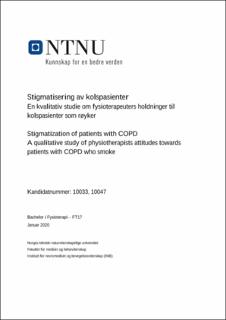Stigmatisering av kolspasienter En kvalitativ studie om fysioterapeuters holdninger til kolspasienter som røyker
Bachelor thesis
Permanent lenke
https://hdl.handle.net/11250/2656693Utgivelsesdato
2019Metadata
Vis full innførselSamlinger
Sammendrag
BakgrunnKronisk obstruktiv lungesykdom, kols, er en progressiv og livstruende lungesykdom som rammer mange millioner mennesker verden over. Studier viser at røyking, som er den største risikofaktoren for utvikling av kols, er en av årsakene til at flere kolspasienter opplever negative holdninger i tilknytning til diagnosen.
HensiktHensikten med oppgaven er å undersøke fysioterapeuters holdninger til kolspasienter som røyker, og om negative holdninger potensielt kan bidra til stigmatisering i behandlingssituasjon.
MetodeDet ble brukt kvalitativ metode for å innhente data fra tre semistrukturerte forskningsintervju. Transkripsjonen ble gjort under selve intervjuene, og senere analysert med bakgrunn i den hermeneutiske forståelsesmåten.
ResultatResultatene viser at fysioterapeuter kan oppleve det utfordrende å arbeide med kolspasienter som ikke forstår eller ønsker å forstå konsekvensene av røyking. De er likevel opptatt av at kolspasientene skal få lik behandling uavhengig om de røyker eller ikke. Vi fant også et sprik i vektlegging av kunnskapsbasert praksis og hvordan fysioterapeutene praktiserer faget i møte med kolspasienter.
KonklusjonVi kan ikke utelukke at det kan oppstå negative holdninger og stigmatisering mot kolspasienter i pasient-terapeutrelasjonen, selv om resultatene våre ikke antyder at dette er tilfellet hos våre intervjupersoner. Oppgavens resultater gir grunnlag for kritisk tenkning og refleksjon over egne holdninger i arbeid med pasientgruppen. BackgroundChronic obstructive pulmonary disease, COPD, is a progressive and life-threatening lung disease affecting millions of people worldwide. Research has shown that smoking, which is the factor that increases the risk of developing COPD the most, is one of the reasons why several COPD patients experience negative attitudes related to the diagnosis.
PurposeThe purpose of this study is to investigate physiotherapists' attitudes towards patients who smoke, and whether negative attitudes can potentially contribute to stigmatization in the treatment situation.
MethodThe data was retrieved through a qualitative method using three semi-structured research interviews. The transcript was made during the interviews, and later analyzed based on the hermeneutic way of understanding.
ResultsThe results show that physiotherapists may find it challenging to work with patients with COPD who do not understand or wish to understand the consequences of smoking. However, they consider it important that the patients with COPD receive equal treatment regardless of whether they smoke or not. We also found a difference in the emphasis of knowledge-based practice and how physiotherapists practice the subject in meeting patients with COPD.
ConclusionWe cannot exclude the possibility that negative attitudes and stigma may be encountered in patients with the patient-therapist relationship, even though our results do not indicate that this is the case in our interviewees. The results of the thesis provide a basis for critical thinking and reflection on one's own attitudes in working with the patient group.
